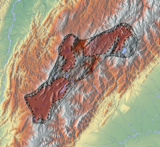Nompanim
| Nompanim | |
|---|---|
| Iraca | |
| Predecessor | "Bermejo" |
| Successor | Sugamuxi |
| Born | unknown Muisca Confederation |
| Died | unknown Muisca Confederation |

Nompanim or Nomparem (
.Biography
According to the traditions of the northern Muisca, the iraca of Sugamuxi was chosen alternating between the caciques of Firavitoba and Tobasía. Nompanim, from Tobasía, was the successor of Bermejo (Spanish given name), as cacique of Sugamuxi. Bermejo was an usurper to the throne of Sugamuxi, allegedly because he was a redhead.[2] Nompanim supported zaque Quemuenchatocha with an army of 20,000 guecha warriors in the Battle of Los Arroyos against zipa Nemequene, fought around 1514.[2] The army of the zaque, supported by Nompanim, Tundama, and the caciques of Gámeza and Sáchica won this battle and Nemequene died the next day, succeeded by Tisquesusa.
The seat of Nompanim was the Sun Temple in Sogamoso, that was destroyed by soldiers of Gonzalo Jiménez de Quesada in September 1537.
Nompanim installed four new laws for his people: 1; don't kill, 2; don't steal, 3; don't lie and 4; don't take someone else's wife. The first crime was punished with the death penalty and for the other crimes lashing was the punishment at the first incident, personal dishonouring for the second and inherited dishonouring for the third time.
Nompanim died in an unknown year shortly after 1514 and was succeeded by
Nompanim in Muisca history
| History of the Muisca | |||||||||
 | |||||||||
 Altiplano |
 Muisca |
 Art |
 Architecture |
 Astronomy |
 Cuisine |
 El Dorado |
 Subsistence |
 Women |
 Conquest |
See also
References
- ^ Universidad Distrital Francisco José de Caldas
- ^ a b (in Spanish) Sugamuxi and Nompanim - Pueblos Originarios
